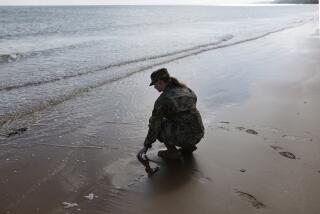Britain says goodbye to Harry Patch, the last of its World War I soldiers
- Share via
WELLS, ENGLAND — The cathedral bells pealed for an entire hour, tolling not just one man’s death but the passing of an era.
Harry Patch was 111 when he died two weeks ago, and his body was laid to rest Thursday after a memorial service here in the medieval city of Wells, in southwestern England.
But it wasn’t for his longevity that hundreds of mourners lined the streets and gathered solemnly on the cathedral lawn under rainy skies. It was to honor Britain’s last survivor of the trenches of World War I, the last man on these shores who bore firsthand witness to the blood-soaked conflict that forever changed Europe and the course of the 20th century.
Not that Patch, a modest fellow, would -- or could -- have picked that role for himself. Nor could he have foreseen, as an 18-year-old plumber’s apprentice drafted into the infantry, that his funeral 93 years later would be attended by masses of people he had never met: diplomats and aristocrats, veterans and civilians who converged on Wells to pay their respects.
“He was both a national icon and, at the same time, an ordinary man,” his friend Jim Ross told mourners in Wells Cathedral, as well as the untold numbers who paused at home and in the office to watch the midday service live on television.
Soldiers from Britain, France, Germany and Belgium escorted Patch’s flag-draped coffin to the church, a reflection of his plea for peace and reconciliation in his later years.
After the service, a duo of buglers sounded the last post, Britain’s version of taps. Uniformed veterans wiped away tears, their chests pinned with medals that would have gleamed in the sunshine if there had been any. It seemed fitting that there wasn’t.
The outpouring of national emotion over Patch’s death was yet another reminder that, nearly a century later, World War I continues to exert a hold on the British imagination unmatched by any of the conflicts since, even though the “war to end all wars” didn’t.
Unlike in the United States, whose “Greatest Generation” featured those who fought in World War II, for Britons -- and countless other Europeans -- that distinction belongs firmly to the soldiers who endured misery and death by the millions on the fields of Flanders.
The tremendous death toll is part of the reason why: Britain and its imperial territories lost a staggering 900,000 troops, leaving almost no family untouched. Go to even the tiniest community in the British countryside and you’ll find a monument in the parish church or on the village green commemorating the sacrifices of local young men who fell in the war.
“A whole generation was wiped out,” said Monica Williams, 64. Two of her great- uncles died in battle.
The war also served as a social leveler in class-ridden Edwardian Britain. The sons of noblemen and commoners mingled in the hell of the front-line trenches; machine-gun bullets made no distinctions between officers and “Tommys,” or foot soldiers.
The war’s legacy has lived on in various, and sometimes unlikely, corners of British culture.
Some of the finest English verse of the 20th century was produced by soldier-poets such as Wilfred Owen and Siegfried Sassoon; their works are still studied by British schoolchildren today. More recently, critics have lauded author Pat Barker’s “Regeneration” trilogy of books, which deal with the psychological damage wrought by the conflict.
The creators of the 1980s historical sitcom “The Black Adder,” starring Rowan Atkinson of “Mr. Bean” fame, set its final season during World War I, ending with an emotional knockout that’s still talked about years later, in which the main characters charge over the top of their trench and are ruthlessly cut down.
Just days ago, the band Radiohead released a single paying homage to Patch, its lyrics based on his own words: I am the only one that got through The others died wherever they fell . . . Give your leaders each a gun and then let them fight it out themselves.
In November, Patch and two other World War I veterans, Henry Allingham and William Stone, attended the annual Armistice Day ceremony in London. But Stone died Jan. 10 and Allingham on July 18. Patch followed exactly one week later. This year’s Armistice Day service will be the first with no veterans of the Great War.
Matt Copley, 33, watched Allingham’s funeral on TV, and promised himself that he would attend Patch’s. On Thursday morning, he and friend Kevan Manwaring caught a bus in the city of Bath for the 80-minute trip to Wells.
“The First World War was unlike any war that had ever happened before,” said Copley, who carried with him a copy of Patch’s memoir, “The Last Fighting Tommy.” “The catalog of horrors we grew up with -- it was all there. It shook everything up so badly. No one had ever gone through anything like that before, and wouldn’t again.”
The bells were still ringing when Copley and Manwaring reached the cathedral lawn.
Patch, who outlived two wives and two sons, never spoke about his wartime experiences until after he turned 100 and reluctantly submitted to the first of what became many interviews. A former gunner, he revealed that he was haunted by the deaths of three men on his team, who were killed when a German shell burst above them and sent shrapnel flying.
Patch was wounded in the September 1917 incident. A medic removed a piece of shrapnel from his groin without benefit of anesthetic while four of his comrades pinned his limbs down.
His war service was over, but not the battle he was helping to fight at Passchendaele, Belgium. At the end of the three-month battle, more than half a million soldiers on both sides lay dead. The British “won” by having advanced five miles.
Toward the end of his long life, his dam of silence broken, Patch became a vocal advocate of peace and was proud of his status as one of the dwindling band of Great War veterans in Britain. (A British-born man who served in the Royal Navy during the war remains alive in Australia, British defense officials said.)
But there were still times Patch wished that what was in the past would stay there.
“As I say, World War I is history,” he once said. “It isn’t news. Forget it.”
There is little chance of that.
--
More to Read
Sign up for Essential California
The most important California stories and recommendations in your inbox every morning.
You may occasionally receive promotional content from the Los Angeles Times.











